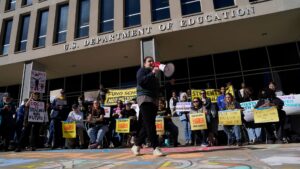The Fight for Education: Understanding the Impact of Political Decisions on U.S. Schools
At Extreme Investor Network, we recognize that personal finance is deeply intertwined with public policy, particularly in the realm of education. Recent events surrounding U.S. education policy have raised significant concerns among educators, students, and parents alike. Here’s a closer examination of the ongoing debates, their implications, and what you can do to stay informed and engaged.
The Landscape of Education Policy
In March 2025, protests erupted outside the U.S. Department of Education in Washington, D.C., as demonstrators rallied against a controversial executive order aimed at dismantling the department. The rally highlighted a crucial point: education is not just a political agenda; it’s a lifeline for millions of families navigating financial futures. With over 17 million families applying for college aid each year, the stakes are high.
The Legal Battle Unfolds
The Trump administration recently sought the Supreme Court’s intervention to reverse a court ruling that reinstated over 1,300 employees who had been terminated as part of a larger strategy to streamline the Department of Education. The current Solicitor General argues that the layoffs were necessary to eliminate functions that are better handled at the state level. However, critics point out that such drastic actions could dismantle essential services, particularly those enforcing civil rights protections in education.
High-profile cases like this remind us of the importance of understanding the legal frameworks behind education policies. For families relying on federal student aid, the elimination of key staff overseeing the Free Application for Federal Student Aid (FAFSA) could spell disaster. With the absence of these crucial roles, many might find themselves without the resources necessary to secure financial aid for higher education.
The Historical Context
The U.S. Department of Education, established by former President Jimmy Carter in 1979, has continually faced existential threats from various administrations. From President Reagan’s call for its closure to proposals of merging it with the Labor Department during Trump’s tenure, education policy remains a battleground. Understanding this history is essential for appreciating current events and their ramifications.
Your Role: Advocacy and Awareness
-
Stay Informed: Follow credible news sources and engage with community forums to understand the implications of education policy changes. Knowledge is power, especially in matters affecting your financial health.
-
Advocate for Change: Whether you’re a parent, student, or educator, make your voice heard. Sign petitions, attend town hall meetings, and engage with local representatives to shape policies that affect educational funding.
- Diversify Your Financial Knowledge: Personal finance encompasses more than just saving and investing—it includes understanding how public policies impact your financial landscape. Educate yourself on how changes in education policy can affect your and your children’s financial futures.
Conclusion
The current battle over the U.S. Department of Education is more than a political issue; it’s a critical concern for families across the nation. At Extreme Investor Network, we emphasize the importance of understanding how these developments impact personal finance and overall economic wellbeing. By staying informed and engaged, you can contribute to the dialogue and advocate for a more equitable future in education. Your financial future depends on the choices made today—let’s ensure those choices lead us toward a more prosperous tomorrow.

